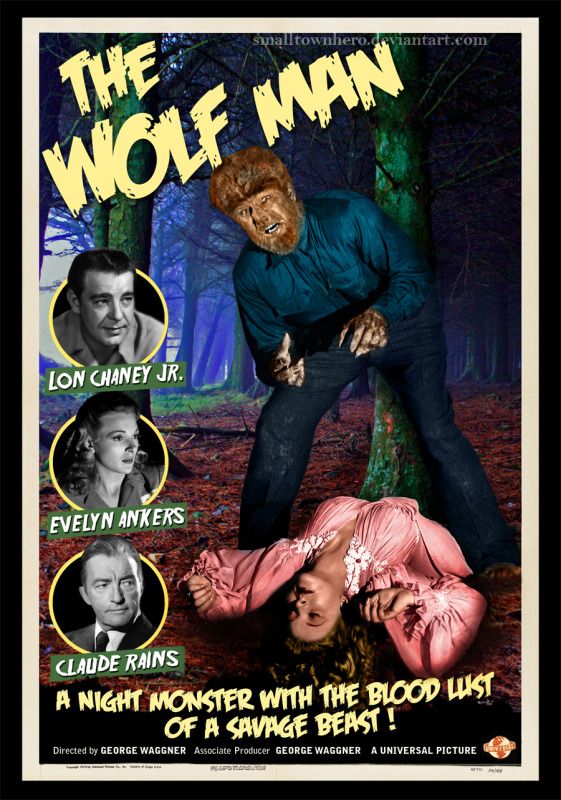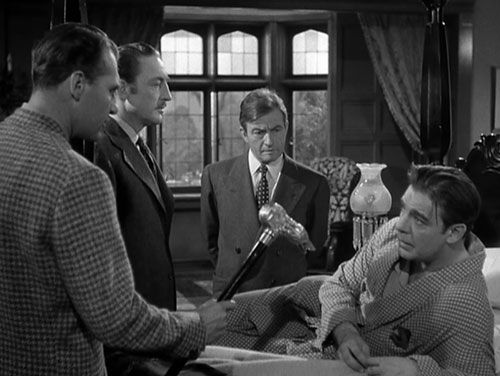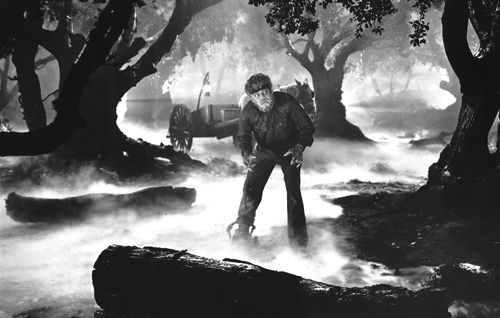Wednesday, October 24, 2012
The Wolf Man
The Wolf Man
1941
Director: George Waggner
Starring: Lon Chaney Jr., Claude Rains, Ralph Bellamy
When you think “classic horror,” you think Dracula, Frankenstein, and the Mummy. Rounding out the list would undoubtedly be the Wolf Man. Unlike the other monsters on this list, though, the Wolf Man is unique in several ways. Instead of being based on centuries-old mythos or classic literature, the Wolf Man came mostly from the mind of screenwriter Curt Siodmak. Similarly, because he was a relatively new invention, the Wolf Man is treated far less as a monster and far more as a very real human tragedy. For these reasons, The Wolf Man is easily my favorite of the early classic monster films.
Larry Talbot (Chaney) is the prodigal son returning home to his scientist father’s (Rains) estate in Wales. He meets and woos shop girl Gwen (Evelyn Ankers), which takes him out into the fog-filled forest in search of a gypsy fortune teller on their date (Bela Lugosi, in a rather fitting cameo). Unfortunately, Bela’s a bit crazy, and he turns into a wolf and attacks. Larry kills the wolf, but when he realizes he also killed the gypsy, he is wracked with guilt. Bitten by the wolf, Larry starts to realize that he himself is turning into the Wolf Man.
On the most literal level, I respond incredibly well to the tragedy found in The Wolf Man. Lon Chaney Jr. proves he’s got chops as he holds nothing back from poor Larry’s story. Larry is just a regular guy, the younger brother, good with tools but not science, who has to take on the mantle of elder brother due to a family tragedy. Larry wants to do right by his dad and his family and his birthright, but when he starts to realize that he is the one causing the violence, he is horror-struck. His remorse at killing the gypsy is all-consuming, and he becomes obsessed with the idea of becoming a werewolf himself. He closes himself off from his friends and family, even insisting that he be locked up and bound at night to prevent his wolf form from escaping and killing his loved ones. Larry is sad and sympathetic all the way. He never feels like a traditional movie monster.
There’s an interesting way to interpret The Wolf Man that goes slightly beyond the literal, an interpretation I discovered when researching the film. I started to be curious about this when I rewatched the film in anticipation of writing this review, and I noticed a bit of an inconsistency. When Larry attacks the wolf at the beginning of the film, the attack that gives him the bite and sets him off down the spiral of lycanthropy, we first see a very definite wolf, completely an animal. The camera cuts to some fog in the forest, then back to Larry. Now Larry is very clearly attacking a human, the gypsy. Cut away, cut back, and he’s facing the wolf again. I suppose one could simply laugh this off as bad editing, but then consider this. When Larry transforms into a werewolf, he is neither full-fledged wolf nor fully man. He is a hybrid of the two, in crazy makeup. Why is he different? Why does he not take the same form as the gypsy werewolf? There are other odd things as well. Larry is bitten by the wolf, but the wound is completely healed the next day. We, the audience, are never shown the wound, which later is visible to an old gypsy lady (Maria Ouspenskaya) but still markedly off screen. When Larry initially transforms into the Wolf Man, he is wearing an undershirt, but when we then see him prowling around outside, he is in a different costume. When – and how – did he change clothes?
Sloppy editing? Possibly. But then I stumbled upon an article on The Wolf Man that offered an alternative explanation. It’s entirely possible to interpret Larry’s lycanthropy as being completely in his head, an interpretation that the film itself corroborates through the voice of Larry’s father, the empiricist. When Larry returns to Wales, he is immediately overcome with the superstitions of the location, and after he discovers that he actually killed Bela the gypsy because he *thought* Bela was a wolf, he is overcome with guilt and grief at what he is done. This preys upon him so deeply that he becomes paranoid and withdrawn. Incapable of confronting those around him with what he has done, he invents a reason to stay away, and that reason is drawn directly from the superstition around him. All of the Wolf Man’s attacks are solo, involving only Larry and his single victim; that way, there are no witnesses to whether Larry truly turned into the Wolf Man or not. There is little to no physical evidence that suggests Larry has actually transformed. Whether or not you choose to believe this particular interpretation, at least you’ve got to admit it’s a distinct possibility. For me, it’s a tantalizing possibility. What is, on the surface, a better-than-the-rest monster flick has now become a psychological thriller, a man unaware of the power of his own mind. As a film, The Wolf Man manages to maintain some ambiguity around this point as well, as it slyly hints at this possibility without committing either way.
In researching a bit for this review, I also discovered a fairly astonishing fact about Siodmak’s script. While Dracula and Frankenstein were monsters based on classic literature that was, in turn, based on the mythology of the ages, Siodmak had no such source material. He personally invented most of the werewolf tropes we see in this film that we have subsequently accepted. The concept of a werewolf passing on his wolfish tendencies by biting his victim is straight from Siodmak, as is the idea that a werewolf can only be killed with silver. It seems odd, somehow, that such notions are as young as this, or that they were purely invented for the movies. Siodmak drew inspiration from classic vampire tales, though, hence the similarity between a werewolf bite’s effect and a vampire’s, as well as the parallel with silver.
On a sheer entertainment level, the quality of the actors in The Wolf Man is staggering. This may have been treated like a B picture, but the quality is hardly second rate. Chaney serviceably carries the film, portraying angst and despair very well. Add in Claude Rains, aka Mr. Awesome (as I like to call him), Ralph Bellamy, Ouspenskaya, and Lugosi, and suddenly we’re talking an A list cast. This might be a superficial monster flick, but man, it’s got great pedigree.
Rather than blood and guts, The Wolf Man is ultimately a tale of tragedy and pathos. It feels richer and more substantial than, say, Frankenstein or Dracula. Add in possibilities for multiple interpretations, a surprisingly original script, and first-rate actors, and can you really wonder why this is my favorite of the classic monster movies? You shouldn’t.
Arbitrary Rating: 8/10.
Labels:
1001 movies,
1940s,
1941,
8 out of 10,
american,
the wolf man,
waggner
Subscribe to:
Post Comments (Atom)



While I think I lean more toward Karloff's portrayal of Frankenstein's monster, I love this film as well. Chaney simply works as an unlucky shlub who suffers from a terrible curse. He, as a guy unable to escape this fate, puts in a great performance.
ReplyDeleteTragedy and pathos, indeed!
In terms of individual performances, it would be harder for me to choose between Chaney and Karloff, but I think "The Wolf Man" holds together as a film better than "Frankenstein." Part of that simply might be the ten years that Wolf Man has on Frankenstein, and the advances in technology gained in those ten years.
DeleteThis one was a surprise for me. I wasn't expecting to like it as much as I did.
I do remember thinking that Chaney's character felt like he got a really raw deal in this movie, as compared to the classic monsters in other films.
ReplyDeleteIn regards to the alternate theory on the inconsistencies in the movie, I'm going to use Occam's Razor and say I feel it was just bad editing.
I can understand that, I really can (re: the interpretation), but I am entranced by the POSSIBILITY of it. It's a thing with me - a surefire way to get me more excited about a movie is to point out multiple interpretations that actually make sense.
DeleteNow that I have read your review I can see that we came through this film quite differently. I am afraid I am on Chip's side here believing it is just sloppy editing. There are just too many of those glips in the movie.
DeleteThat said, I wish it was a psycological thriller, that it is a battle taking place in Larry's mind. That would have made a much better movie.
It is indeed an A list cast and possibly why I expected more from The Wolf Man.
Ah well, just agree to disagree on this one. To me, there are too many little "slips" that are all pointing towards one idea to be just sloppy editing. But such is the joy of film - various interpretations!
Deletewwhc993knx
ReplyDeletegolden goose outlet
golden goose outlet
golden goose outlet
golden goose outlet
golden goose outlet
golden goose outlet
golden goose outlet
golden goose outlet
supreme outlet
golden goose outlet